The following 10 Foundry Virtual Tabletop modules are so universally essential that everyone should immediately install them:

Nothing. There is no such list, and there never can be.
First off, I apologize for the clickbaity title and flippant answer (“Hey guys, don’t forget to smash those like and subscribe buttons!”), but I feel this is an important topic which deserves a little bit of sass.
While lists of recommended modules can be useful resources when used properly, they can also be unhelpful and even counterproductive without proper context. This is particularly true for users who are new to Foundry VTT, and unfortunately new users are the ones (understandably) looking for such lists to help them get started.
Issues with recommended module lists
As much as I personally love modules (I’ve even created a few), and even though there is a vast universe of amazing modules for Foundry Virtual Tabletop that can improve the online tabletop gaming experience for you and your players, there is no magic one-size-fits-all-list of modules. This is true for a variety of reasons:
- Both Foundry VTT and its modules evolve constantly and static lists do not.
Over time, modules may stop being maintained and/or their functionality may be incorporated into core Foundry. When people find outdated lists that contain such outdated modules, it can lead to confusion and significant problems.
For example, if you see a module list that recommends Deselection or Teleport modules, move on. That list is dangerously outdated and should not be used. - Some modules may not work for your game system.
Many lists of modules assume that you are playing D&D 5E. Even modules that claim to be “system agnostic” may have issues in a particular game system or be much less useful. - Each person has different preferences and needs.
Even if you are using the same game system as the person who created the list, such as D&D 5E, people want different things. Some people want as many rolls automated as possible to make things easier and faster, and others want a fully manual process they can control fully. More people fall somewhere in between. Also, just because a module is widely used, such as on that provides 3D dice, you may personally not like it or remember to use it. Unused modules bloat your game unnecessarily. - Some modules are incompatible with other ones.
The module on the list may be great by itself, but it may conflict with another module you are using and love. In particular, try not to install more than one module that extensively overhauls the same part of Foundry, particularly ones that roll dice and generate chat cards with the results. If you do this, be cautious and be prepared that modules my just not play nicely with one another. - Lists can encourage installing many modules at once.
Installing every shiny module on the list can be tempting, but in practice this is not a good idea. It results in a “blob” of new functionality that is confusing and makes it very hard to know where one module starts and the next ends. To get the most out of each module, install one at a time, view its documentation, play with its settings, and try to understand what it’s doing. - It’s important to know how “core” Foundry works before adding modules from a list.
Similarly, try using Foundry with as few modules as possible at first. You may find that you prefer the core Foundry functionality over popular modules in some cases, and it helps greatly to understand what your modules are actually doing once you do add them. It also makes it much harder to debug issues when they do occur.
Find things that you wish you could do, and specifically find modules that add that functionality or smooth out processes that feel rough or awkward to you. When you do, add them slowly.

Not a good idea if you installed Foundry yesterday (or ever, probably).
Okay, fine, but really, where’s the damn list?
With all that said, a list of module recommendations can obviously be very helpful if you keep all the above cautions in mind. You can discover things that you didn’t know existed, or you can think about a module in a new way.
Finding other users who play the same game system and who have similar philosophies and tastes and discussing your favorite modules is preferred over a list, but if you really must… Reddit, YouTube, and the Foundry Discord, have many such lists of recommendations that you can find, just make sure that they are no more than a month or two old at most and only then if no major new stable Foundry VTT version has come out recently. If it has, all bets are off and you need to be even more careful than usual.
Here at Foundry Hub, there is a list of modules sorted by their popularity, as measured by their install rate on the excellent Foundry hosting service The Forge. Additionally, ratings and reviews are available in these listings. The Foundry Hub forums are also a great place to discuss modules and see what other people are using. Upcoming articles will present examples of how to use combinations of modules to achieve amazing results. The Foundry Hub even has plans of listing modules you love right in your user profile.
Just remember kids: view any list of recommended modules with a critical eye, keep an eye out for shiny new finds, and have fun out there!
Editor’s Note:
Thanks to the members of the community who helped editing this post. It was very much appreciated!



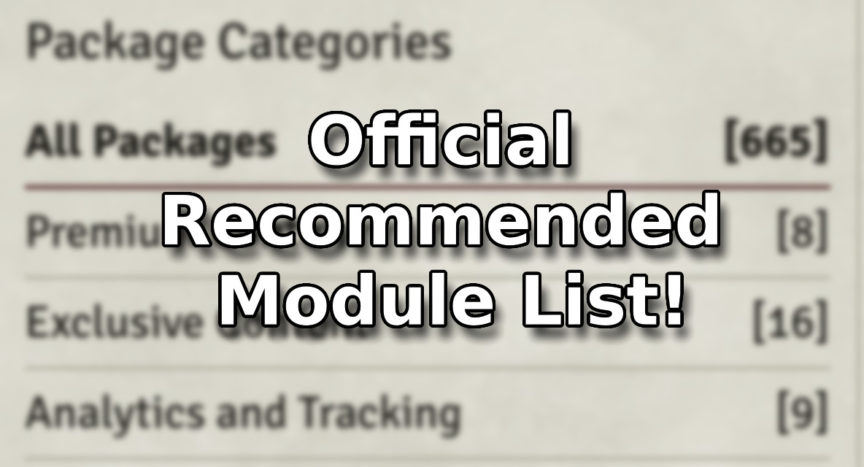

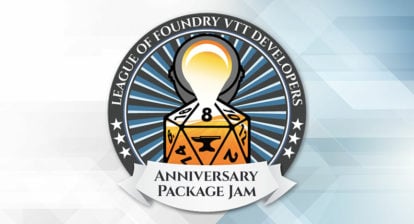

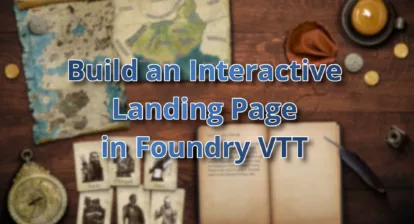
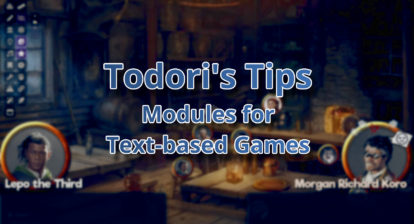
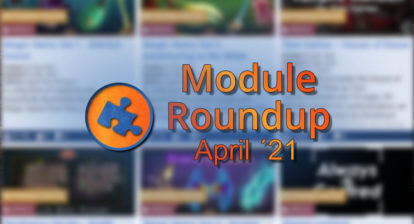
None of my modules were listed. This list is sham!
Wooh! Our first complaint!
This article couldn’t hit things more on the head. Learn the core, slowly add only what you really need. That will make you a happy GM. Avoid the urge to grab every shiny plugin that comes along and you’ll have a wonderful, stable platform from which to run your games.
Yep. I see this advice and think, “Why didn’t I know this when I first started?”. I’m running 67 modules and keep thinking I could get rid of a few… maybe…not that one…
I find it weird that so many great modules are downloaded and used by less then 3% of the users. Get in there people. Endorse your favorites. 😉
I agree and frequently do exactly this!
I usually do it directly when talking to a person and have an idea what they want. Recommending modules is one of my favorite hobbies, to be honest! List form is just… not the way to do this though.
This makes some really good points — and I am absolutely guilty of bulk install of modules and not actually knowing which is doing what anymore (because shiny things are very enticing and I am a weak man). Which means it’s probably time for me to go through those 100+ modules and figure that out. Uuugghh.
Here’s where I’m likely to stand apart from the crowd: I DO NOT agree that providing a list of recommended modules, particularly if they’re curated for a particular game system, is “bad”. I only started working with Foundry towards the end of 2020 and needed SOME PLACE to start in order to provide functionality I considered a requirement in order to make the platform usable – I needed a reliable method by which I could import characters, monsters, and game content. I needed things like the ability to have my players’ tokens transport from points on one scene to another. I wasn’t needing Foundry to do ALL the work, but some functionality within the ruleset to allow the DM to DM and not spend all their time looking up spell effects and manually importing monsters IS (in my opinion) a pre-requisite. Unfortunately, I’m increasingly finding this attitude among some players and developers using Foundry that “you have to start with the basics”. While I understand part of what they’re saying – that the coding used can be complex and understanding what modules interact with each other is helpful with troubleshooting – I do find the “you have to start with just the basics before you’re allowed to use the modules that will help you do what you want” to have the scent of elitism…especially when you’ve reached out to someone for help and had the audacity to misunderstand which module might have been to blame.
Unfortunately, this seems to be a common drawback with community developed products – there seems to be this sense that you must be a coder in order to use the product. Respectfully, that’s not what we (the consumers) paid for. Yes, I understood going in the community development was going to mean that one module may not be compatible with another and that developers that do this work on their own time cannot be expected to crank out bug fixes on the same schedule as someone that’s doing the development full time. I hope that, in time, Foundry may recognize that their competitors are offering a certain level of functionality out of the box and that, if they want to remain competitive in the marketplace, providing a “known compatible” list for the more popular game system helps them to do that.
My two cents…
I completely agree with you here. I know that if we point what we think are the best, peoples may miss something that could have been great because they didn’t search, but it’s at least a point to start. That way, if you are astonished by this “best” list, you will likely give more chance or more time to get accustomed by Foundry.
My previous comment was in reply to mjmcmahon67. (sorry no way to edit the comments)
I agree with you. One of the concerns I see in a bunch of forums for people thinking of moving to Foundry is that “you need to be a programmer to use it”, and this includes references to macros as well.
I did install a bunch of modules, because coming from another VTT my players and I were used to doing things and they were not possible in the core product. But I had to sift through multiple forums (Discord, Reddit and FB) over many weeks to get the answers.
(and it gets worse when you start to look into the macros)
My thoughts for the Foundry Hub was that it was going to have nice documentation and some recommendations for new comers – somewhere where we could point people to who dont like the discord format.
I realize it is new, but at the moment the module recommendation is to go to lots of other places to search for stuff and the macro recommendation is to goto github which is set up for programmers and is very daunting and doesnt really tell you anything about how to write a macro, or key components of it- so what is currently the point of the hub?? Is it just for “how to use core”?
I’m not sure how anybody can realistically think that’s anything unique to Foundry. Roll20 has a scripted macro engine. Fantasy Grounds has scripted effects. Foundry is plenty functional without them, but so are R20 or FG.
…they’re just better if you’re willing to learn a little coding. Foundry has the added benefit that JS is useful in other ways that just for the VTT.
My comment above is actually about to become more relevant as we are about to see an influx of people from Roll20 as they have announced the removal of the Legacy lighting, which is pushing alot of people to Foundry.
I think a “Here is an example of modules that will make your transition from Roll20 to Foundry smoother for your players”
You’re right, this is indeed a clickbait title with a flippant answer. Since it is my first introduction to Foundry Hub, I will now advise my players to stay away from here if they want useful information.
That being said, here’s my list: https://youtu.be/FUQSwq2ul5w
Hope there will be a Add-on Modules Shop.Like chrome web store, people can vote and give comment
The Forge does something like this. I’d suggest checking it out.